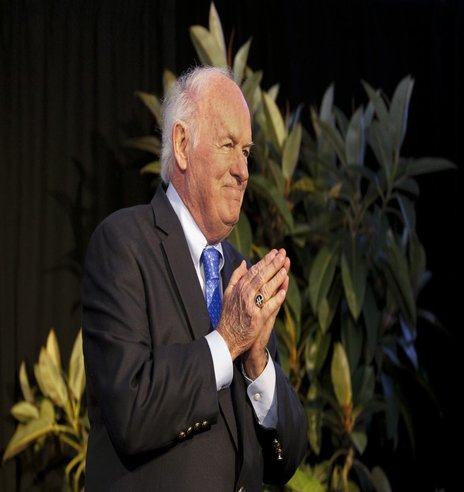This is the second $100 million donation Sanford has made to UC San Diego this decade.
La Jolla billionaire Denny Sanford’s quest to improve the human condition through large, targeted donations has produced another windfall for UC San Diego, which will receive $100 million to study empathy and compassion and to cultivate those qualities in physicians.
The gift is among the largest of its kind ever made in the U.S. and involves an area of science that’s only recently acquired the tools to explore the matter deeply.
Sanford also gave UCSD $100 million in 2013 to create a center where researchers are trying to speed the process of turning discoveries into new drugs and therapies. And he gave San Diego’s National University System $100 million last year to teach civility and thoughtfulness to children in hopes of curbing violence, bullying and discrimination.
San Diego-based institutions have received at least $459 million in donations over the past 12 years from the 83 year-old Sanford, who says he plans to give away all of his money before he dies. Forbes estimates his wealth at $2.6 billion.
“Denny believes that people can be better than they are and he wants to help them change. You see this through his giving,” said Dr. David Brenner, vice chancellor of health sciences at UCSD. “He believes in compassion, civility, being engaged.”
Brenner said Sanford’s latest $100 million donation was influenced by a private meeting he had with the Dalai Lama when His Holiness visited UCSD in 2017 to give the commencement address.
Sanford confirmed this in a statement, saying, “I have been inspired by the work and teachings of the Dalai Lama, whose interest in the intersection where science and faith meet is deep and profound.
“I have had the opportunity to see how grace, humanity and kindness can change people and the world. This gift extends that vision.”
Sanford added that, “Doctors work in a world where compassion is essential, but often lost in the harsh realities of modern medicine. If we can help medical professionals preserve and promote their compassion, based on the findings of hard science, the world can be a happier, healthier place.”
Philosophers and theologians have studied the nature of empathy and compassion for thousands of years. But the subject has received limited attention from scientists because they’ve lacked the research tools needed to pinpoint and probe brain activity tied to those qualities.
“We didn’t have robust ways of measuring things, but that’s been changing,” said Dr. William Mobley. associate dean of neuroscience initiatives at UCSD.
“We now have things like functional MRI, an imaging tool that helps us detect activity in the brain. We also can use EEG (electroencephalogram) in more clever ways to look at the brain. We can see where activity is occurring in 3-D space. We can do a lot of things that were not possible just 10 years ago.”
He added that “our religious traditions and political systems have not enabled us to avoid terrible unhappiness. I think that understanding the brain will not only help us understand empathy and compassion, but how to use these qualities effectively. We’ve been just scratching the surface.”
Most of the research will be conducted through the newly established T. Denny Sanford Institute for Empathy and Compassion. The university expects to collaborate with other institutions, including National University and the University of South Dakota Sanford School of Medicine.
Sanford, who made his fortune in the banking and finance industries, maintains his primary residence in South Dakota. But he spends much of his time in La Jolla. He has a home near the Scripps Pier.
“It’s no longer unusual to see universities get $100 million gifts for things like sports complexes and business schools, which quite often draw controversy about whether its the best use of the donor’s money,” said Dan Parks, managing editor of the Chronicle of Philanthropy in Washington, D.C.
“But it is highly unusual to see a gift of this size to study such things as empathy and compassion.”
Sanford represents a super-charged version of the sort of rags-to-riches stories once written by Horatio Alger.
In a story well known among philanthropists, Sanford was born in St. Paul, Minn. during the Great Depression to a family of modest means. His mother died of breast cancer when he was four. His father put him to work in his clothing warehouse when he was eight.
He overcame a difficult childhood and earned a degree at the University of Minnesota, where he majored in psychology. Sanford then went into sales, eventually earning enough to buy a bank in South Dakota. The enterprise, which he renamed First Premier, specialized in serving customers who had bad credit.
Sanford amassed a fortune in banking and began to emerge as a philanthropist in the late 1990s, initially by making donations for his most cherished cause, the care and education of children. He has since donated more than $1 billion nationally, with most of the money going to health, medicine and education.
Roughly a decade ago, he became friends with Brenner, who convinced Sanford to donate $100 million for what has become one of the largest translational medicine centers on the West Coast.
More recently, Brenner has focused on the need to cultivate more empathy and compassion among doctors.
“They have to spend a lot of their time filling things out on a screen instead of looking at their patients,” Brenner said. “It adds to burn out.”
Brenner led a delegation of UCSD physician-scientists to India in late May, where they met with the Dalai Lama to discuss the problem.
The meeting helped Brenner iron out the final details of Sanford’s new $100 million gift to the university.
“The Dalai Lama said that we must show that there is a scientific basis to empathy and compassion,” Brenner said. “That’s what Denny’s gift will help scientists do.”
